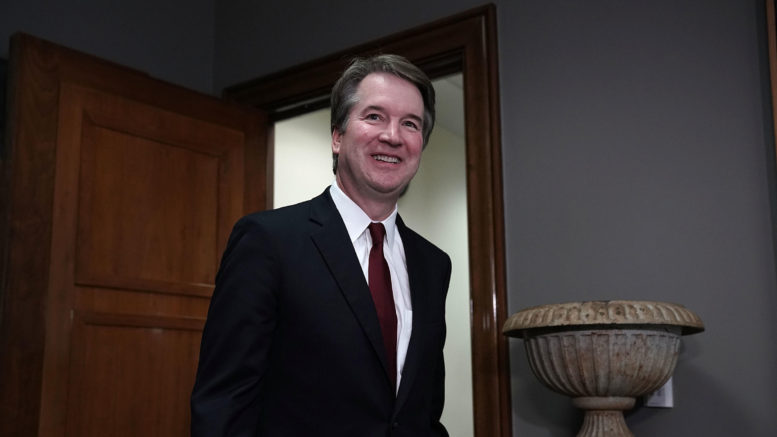Imagine you are a reputable gentleman in your fifties. Now imagine that someone suddenly alleges that more than thirty years ago, when you were in high school, at a party, you were drunk and tried to kiss her against her will. How do you defend against this allegation? Do you have witnesses thirty years after the fact? Do you have any other evidence? Can you prove that you were not at a party thirty years ago? Can you prove anything especially when even the year of the alleged incident is unknown—let alone date, location or anything else? What do you do and how can you possibly defend against this allegation? The short answer is you, very likely, have no realistic way of disproving the allegations.
Now imagine that not only had that person stayed silent for thirty years, she had stayed silent for three months during your nomination hearing; instead, using this time to hire an anti-Trump lawyer, and take a polygraph test, all in preparation for coming out on the eve of your confirmation vote in order to delay it sufficiently until after the mid-term elections. It also does not help that the alleged victim has been a vocal anti-Trump activist and a routine financial contributor to far left causes.
There are two concepts in law that may shed light as to why these types of tactics have long been outlawed in courts based on centuries of legal proceedings–and why Republicans should stand firm to not allow weaponization of allegations of sexual harassment. The first is statute of limitation. Generally, a person is not allowed to bring a claim, whether in civil court or in a criminal proceeding, after a certain period of time has passed. The logic behind this rule is at least two-fold. First, years after the alleged incident, there are no evidence and no witnesses. Even if there are witnesses, they have vague memories. Witness identifications and recollection already suffer from great inaccuracies, resulting in many unjust criminal convictions. One can only imagine the outcome if witnesses were allowed to testify decades later. The second rationale behind the statute of limitation is the assumption that if the event was significant enough from the perspective of accuser, she would have probably come forward earlier. This is not to say that a lot of victims of sexual assault do not stay silent out of shame, or out of fear that others do not believe them. But no one can determine with any degree of certainty the facts of what happened in a he said, she said situation—so there has to be a balancing of the opposing forces.
The second legal concept that may shed some light on the situation is the defense of laches. Generally, if an allegedly aggrieved party intentionally delays its allegations—especially if calculated to harm the accused—that allegedly aggrieved party may have waived its right to bring a claim simply because he or she intentionally causes a large degree of unfairness to the accused. This concept is best illustrated in the case of Judge Kavanaugh. The alleged victim knew of Judge Kavanaugh’s nomination at least since July 2018. Did she come forward? Not really. She sent an anonymous letter. Then she hired a Democratic activist lawyer, and took a polygraph test with a former FBI agent. Who takes these actions in anticipation of remaining anonymous? No one. She then waits until the week of Judge Kavanaugh’s confirmation vote to come forward and delay the vote. Coincidentally, the Democratic party has been trying for months to delay Judge Kavanaugh’s vote until after the mid-term elections. Also coincidentally, the alleged victim is an anti-Trump activist with a history of routine donations to extreme left causes. The concept of laches becomes abundantly clear here. Not only Judge Kavanaugh is facing allegations that cannot be disproven thirty years after, he was intentionally deprived of the opportunity to fairly defend himself by keeping these allegations secret throughout his confirmation proceeding, and then suddenly raising them in the week of his confirmation. Of course, nothing sheds light more on this shameful game than the fact that even after being invited to the Senate to speak about her allegations, the alleged victim is now refusing to speak until “there is a full FBI investigation.”
This pattern now sounds all too familiar. Just in the past couple of years, Democrats released the then ten year old access Hollywood tape a month before the election and lined up an array of women to make similar allegations against President Trump right before the election. Later, again a month before the election, similar allegations surfaced against Judge Moore. This week it happened to Supreme Court nominee, Judge Kavanaugh. It is as if this political tactic has been reduced down to a science. This is now a question for the Republicans. Do we want to make this the norm that nominees can be readily derailed if Democrats are able to find someone from thirty years ago to make unprovable (and un-disprovable) allegations? It may make sense for Republicans to stand up and accept the short term political damage, and even a cloud over Judge Kavanaugh’s nomination, but stop this madness by saying that we will not allow you to be heard if you intentionally delay your grief to use it as a political weapon. If a person want to be heard in a political process-even by raising allegations of sexual assault-she has the right to be heard, but only if she does not weaponize her allegations by timing it for the maximum political impact and minimum due process. We do not allow such unfair gamesmanship in any court of law, and we should not allow it in our political discourse. This is unfair to the society, to our nominees, and to victims of sexual assault who are sincere in their desire to be heard and help the society improve.
Share with others: